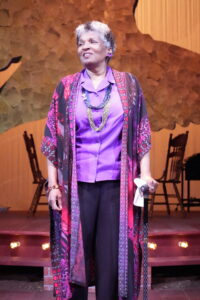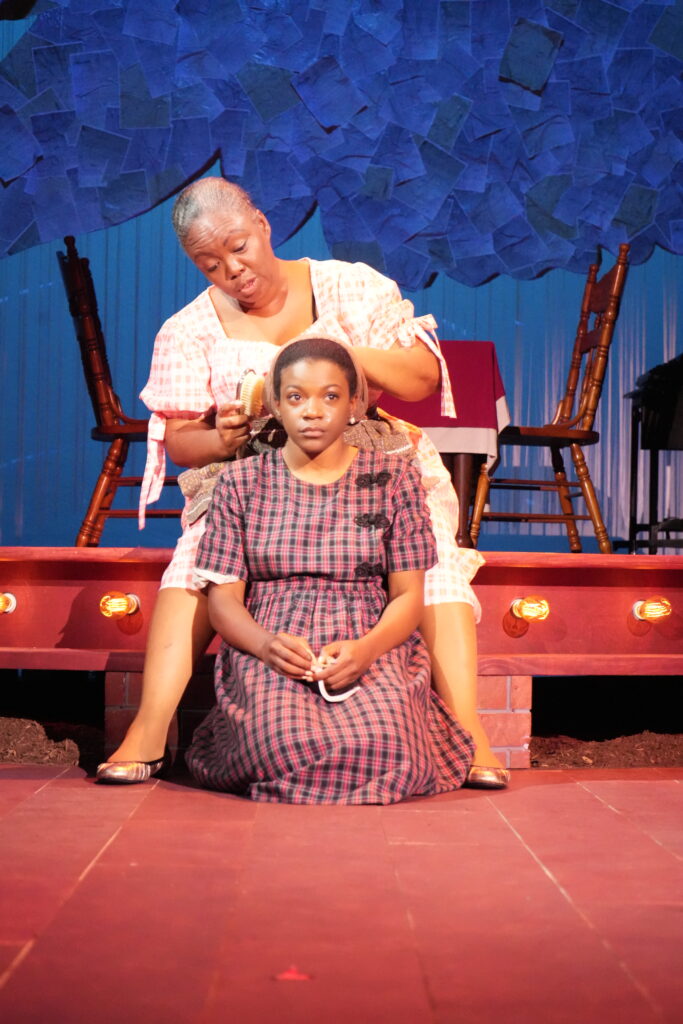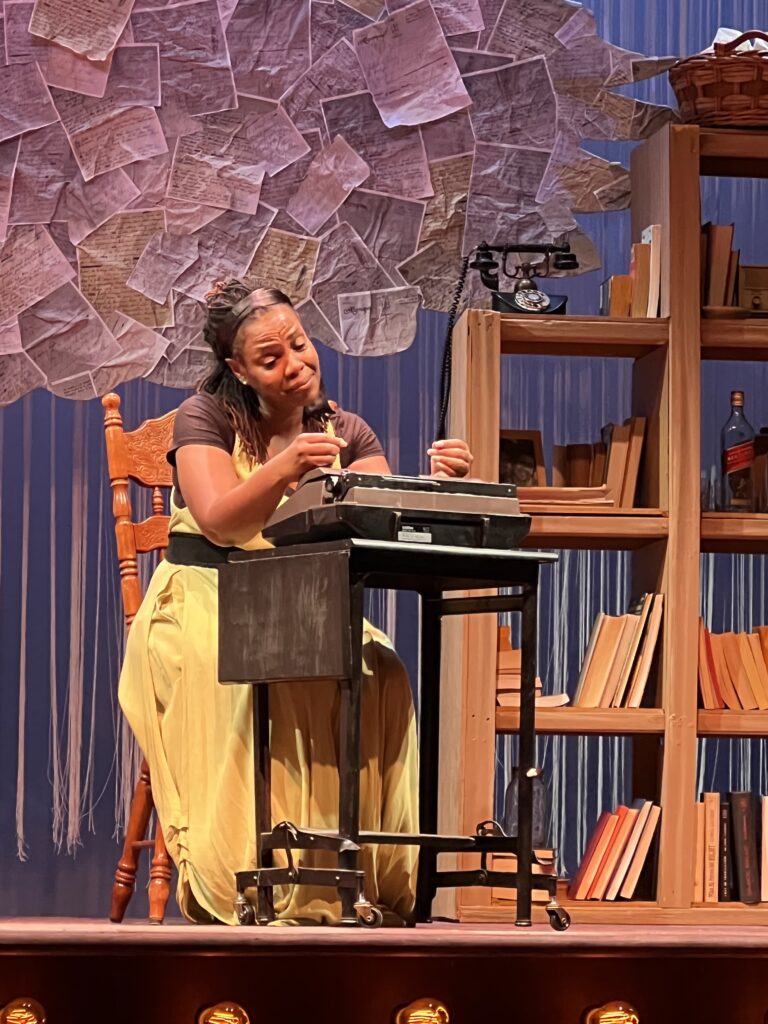Maya Angelou’s Phenomenal Life Tackled In a New Houston Play — The Ensemble Theatre Rises to the Cultural Moment
A Performing Arts Devotee's First Take Review
BY Adrienne Jones // 07.21.23Manniah Harris, Elizabeth Flax, LaKeisha Randle play the three Mayas in Ensemble Theatre's production of "Phenomenal Woman: Maya Angelou" (Photo by Aesthetic Alkhemy)
“We delight in the beauty of the butterfly, but rarely admit the changes it has gone through to achieve that beauty.” – Maya Angelou
It can be daunting to write about so towering a cultural icon as Dr. Maya Angelou. For more than four decades, she has spoken for us in her pursuit of civil rights and to us in her haunting memoirs and poetry. Her work and example have inspired countless women, as well as men, to find their voices and like her rise:
Just like moons and like suns, With the certainty of tides
Just like hopes springing high, Still I’ll rise.
Houston has been honored as the second location for the rolling world premiere of Phenomenal Woman: Maya Angelou by playwright Angelica Chéri. Chéri’s artfully constructed script promises to become the landmark theatrical chronicle of Angelou’s long and complex life. The show runs in Houston at the Ensemble Theatre through next Sunday, July 30th.

In the hands of the always-brilliant Ensemble Theatre, with a gifted cast and under the meticulous direction of nationally acclaimed Jackie Alexander, the production is not only a terrific night in the theater, but an important one.
Alexander, who also directed the play’s initial debut at the North Carolina Black Repertory Company in Winston-Salem, describes his vision: “Given the opportunity to stage the life story of an icon, my goal was to assure the production stayed true to the text and enhance the journey without getting in the way.“
His comment hits on one of the most interesting and unusual aspects of the play. Through a series of flashbacks, the playwright divides Angelou’s life into its most vivid and pivotal periods, drawing on information from Angelou’s seven volumes of memoirs. An elderly Older Maya — played by Elizabeth Flax in this production — serves as the narrator, lecturing at a podium like the professor Angelou eventually became.
Beginning with the first flashback, something rare in theater occurs. The presence of the director and even of the playwright disappears, leaving the story to emerge as if with a life of its own. One wonders whether Alexander had in mind Angelou’s statement in her magnificent speech I am Human, “What I pray for is humility” as he and Chéri handle Angelou’s life story expertly but humbly.
Chéri holds MFAs in playwriting from Columbia University and in musical theater writing from NYU. It seems she may have taken to heart advice often given in writing classes: Don’t talk about what happens. Show it. Because that’s what she and Alexander do. They show us, with great success.

The arc of Angelou’s life as portrayed in Phenomenal Woman is that of a child who rose from adversity to become one of the nation’s most well-known women. A victim of an unthinkable violation at the tender age of 7, Angelou stopped speaking. After five years of silence, the child emerges into a young woman whose voice would touch millions around the world.
But that barebones analysis belies the powerful emotional experience we feel in the theater. From the moment we see 3-year old Young Maya and her 4-year-old brother Bailey alone at a train station being sent away from their divided home in St. Louis to live with their paternal grandmother in Arkansas, they have our hearts.
Many of us are familiar with the story Angelou tells of her young life in I Know Why the Caged Bird Sings, which begins with her childhood and ends after the birth of her son Guy Johnson when she was 17. We may also know her role in the popular television mini-series Roots, and her 10-part documentary mini-series Blacks, Blues, Black! that connects blues music and Black Americans’ African heritage. And who could forget her reciting her own On the Pulse of Morning at the presidential inauguration of Bill Clinton?
Phenomenal Woman touches on all those, but also covers lesser known periods in her life.
Her first marriage to a Greek electrician ends in about the same amount of time it takes for him to angrily declare there’s no such thing as God (and for the audience to respond with a gasp). We learn about her dancing in night clubs in San Francisco, touring Europe in Porgy and Bess and forming the important relationships that steer her toward writing.
Chéri spends time on Angelou’s friendship with writer James Baldwin (“Jimmy,” as she called him) and their participation in the Civil Rights Movement of the 1960s. We see her meet Martin Luther King, Jr. whose speeches impact the rest of her life and propel her activities on behalf of the Southern Christian Leadership Conference. Her activism also puts her on the path to a relationship with South African freedom fighter Vusumzi Make and a year with him in Cairo. Cairo is followed by Ghana where she meets Malcolm X, works as a journalist and an administrator at the University of Ghana, and acts in Ghana’s National Theater.
It’s a whirlwind of a life until Angelou returns to the United States in 1965, but the years are important to the personage Angelou eventually becomes. Sometimes one almost has the impression that Angelou stumbled by chance into opportunity and success because of her travels, the variety of her activities, her talents in the performing arts and serendipitous encounters with writers and influential people who help her. Although, as we see, she doesn’t hesitate to work hard in promoting their goals when she shares them.

Chéri and Alexander pace it all steadily, depending on occasional narration by Older Maya to make sure the audience can keep up with the action. Far from feeling like a newsreel, the effect of the narration is to elevate the storytelling. We travel with Angelou and the other characters until the play closes with the poet’s death in 2014.
An especially poignant device that adds depth is Chéri’s frequent infusion of lines from Angelou’s poetry. A touching moment comes at news of Dr. King’s death, and we hear part of her poem “When Great Trees Fall,” written in his honor:
And when great souls die,
After a period peace blooms…
Our senses, restored, never
to be the same, whisper to us.
They existed. They existed.
We can be. Be and be
better. For they existed.
Bringing a Deceptively Complicated Script to Life
To portray Dr. Angelou and do justice to two other towering figures, Martin Luther King, Jr. and James Baldwin, an extraordinary cast is required. Every actor in Phenomenal Woman meets and exceeds that challenge. Another aspect that adds to the excellence of the production is the harmoniousness of their work as a company. They perform smoothly together, listening and responding to one another, and conveying an uplifting sense that they delight in what they’re doing.
The actors for Older Maya and Adult Maya are the only two who don’t play multiple roles. Uniquely unchanging, they keep the story anchored, while all the others transform in voice and costume, sometimes in little more than a few moments.
Elizabeth Flax (Older Maya) is one of three alums in the Ensemble cast who played in the production in North Carolina. She brings Angelou’s twinkle of the eye, rich speaking voice, hypnotic elocution and natural elegance to the role. It’s hard to imagine a lovelier compliment than the one given Angelou after her death by provost emeritus Edwin Wilson at Wake Forest University, where she taught American studies for 32 years. Angelou, Wilson said, brought “distinction and her unique grandeur” to the University.
Flax succeeds in conveying both of those qualities in her distinguished portrayal.
Although having only one role to play, LaKeisha Randle (Maya) skillfully maneuvers a dizzying succession of Maya’s activities and relationships, her challenges and emotional development. As she allows Maya’s own character to grow and change, she becomes an adroit North Star to the characters coming in and out of her life — a mother, son, brother and husband, as well as the literary luminary James Baldwin and the monumental Dr. King.
Kartez Jackson (Martin Luther King, Jr., Vusumzi Make and eight smaller roles) shines as a smooth, unruffled Dr. King, capturing much of his cadence, determination and equanimity.
Foster Davis (Tosh Angelos and seven other smaller roles) is a terrific actor. He did a memorable job as Pastor Flip Benham in Roe at Stages Theater earlier in the year and performs superbly here as Angelou’s unlikely first husband, moving convincingly and with ease from super smooth to intolerably controlling.
Alric Davis (Bailey, Ensemble, James Baldwin, Guy Johnson, Black Student) is nothing short of brilliant in three of the play’s critical roles — and pulling off 12 quick costume changes. Two require changing age: Angelou’s brother Bailey goes from age 4 to 17. Her son Guy moves from 4 to 19. And James Baldwin is 45.

Davis tells PaperCity that the most rewarding of all the roles is his opportunity to play James Baldwin: “He is a literary icon I have studied for years. Getting the chance to bring him to life — his signature vocal cadence, his exuberance over literature and his deep love for Maya Angelou brings so much satisfaction each night.
“He gave so much of his life, his voice and his work for all of our good. So did Maya. Getting the chance to lend a voice to their voices is not a privilege I take lightly.”
I agree with Davis. It is a privilege to portray, read, lend a voice to — or, in my case, write about — Angelou, King and Baldwin.
Bravos and bouquets to the entire cast and crew of Phenomenal Woman: Maya Angelou. What a fine close to Ensemble Theatre’s 46th season.
Now you understand why my head’s not bowed…
When you see me passing
It ought to make you proud,
‘Cause I’m a woman
Phenomenally.
Phenomenal woman,
That’s me. – Maya Angelou
Phenomenal Woman: Maya Angelou runs through Sunday, July 30 at the Ensemble Theatre, 3535 Main Street. For more information and tickets, go here.




























_md.jpeg)

